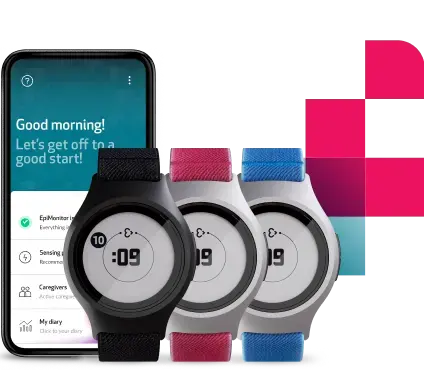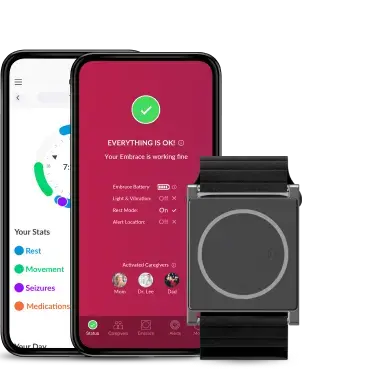The quiet revolution of remote patient monitoring in the time of Covid-19
Remote patient monitoring (RPM) is defined as the monitoring of patients outside hospital conditions by means of technology, such as mobile health (mHealth), health information technology (IT), and wearable devices.
In the time of Covid-19, the remote monitoring of patients is set to be making a substantial impact on society as well as the research community.
What follows is a summary of the main benefits and advantages that this novel field of technology can offer to reduce the burden of the pandemic.
Ability to continuously monitor patients, facilitating early and real-time detection of illnesses
Remote Patient Monitoring systems, like the newly released Empatica Care platform, are designed to obtain physiological data from patients with sensor technologies, continuously, and without the need for face-to-face interaction. The data most commonly collected are pulse rate and pulse rate variability, respiratory rate, oxygen volume in blood or pulse oximetry, signals from the nervous system, body/skin temperature, and levels of activity and rest.
Through an app, the user’s health status is checked and recorded with a qualified medical professional at a centralized monitoring system allowing early diagnosis or intervention when a metric indicates signs of trouble. In a recent study, the remote monitoring system installed by five hospitals in three European countries revealed the first signs of ventilatory and circulatory deterioration before a change in the trends of the respective values became obvious by manual vital signs measurement [1]. Another study has evaluated the feasibility of continuous monitoring of respiratory rate to enable the early detection of pneumonia and its severity [2].
Wearable sensors (such as the EmbracePlus, one of Empatica Care’s tools), can guarantee health monitoring continuity thanks to a comfortable design and the ability to safely, securely, and effectively exchange and use information across systems and platforms (interoperability). This exchanged information can be used in a variety of ways including display, store, interpret, analyze, and automatically act on or control another product.
Increased efficiency and reach in care delivery
Remote monitoring technologies, powered by objective and automated data collection and analysis, offer real opportunities to streamline clinical care, reduce errors, advance precision medicine, and improve medical outcomes.
Hospitals, clinics, and physicians’ offices can provide precise and timely care, saving both time and costs, requiring fewer hospital visits/admissions, fastening patient discharge, reducing avoidable re-admissions. Healthcare professionals can have the ability to share health data with remotely-based clinical experts for consultation - if needed, actively managing treatments for those with chronic conditions [3]. A recent review and examination of high-quality studies on RPM, found that remote patient monitoring showed early promise in improving outcomes for patients with select conditions, including obstructive pulmonary disease, Parkinson’s disease, and hypertension [4].
Patients can have guaranteed continuity and efficiency in their care management, avoiding unnecessary visits (and lengthy booking processes), relying on responsive and targeted medical interventions and check-ups.
Amid the coronavirus crisis, a lower rate of hospital visits, and reduced time spent in waiting rooms, can not only ease the burden on healthcare facilities but also ensures less exposure to diseases for vulnerable patients and healthcare workers.
Protection of front-line workers and communities through the detection and isolation of asymptomatic transmitters
Employers can play an important role in shaping community health care systems through their direct efforts.
Centralized dashboards, such as the one provided by Empatica Care, can help employers or other community leaders to remotely identify early warning signs even without symptoms, enabling clinical-quality insights and fast intervention. This can lead people to swiftly catch and isolate asymptomatic transmitters, maintaining a healthier workforce, and ultimately containing the spread, particularly in the most vulnerable communities or among front-line workers in the Covid-19 fight.
At a higher level, medical personnel can observe, record, and report telltale patterns of symptoms in patients so that local health authorities, mayors, and governors can determine the size, spread, and tempo of an outbreak, anticipating and planning for a new wave of infection.
Higher scalability and efficiency of clinical trials
In response to the pandemic, clinical trial research assessing the efficacy and safety of clinical candidate interventions to treat COVID-19 has been emerging at an unprecedented rate.
As recently reported on The Lancet, most of these trials will offer comparative efficacy data versus standard of care according to local COVID-19 treatment guidelines, but a handful of randomized controlled trials will also provide head-to-head evidence between high profile interventions.
To boost these interventional trials, the need for mobile, secure, and accurate clinical research technologies has never been more urgent.
Remote monitoring solutions guarantee clinically validated data collection remotely, and automatically. Research teams, CRO personnel, and study coordinators can access the continuously uploaded and protected sensor data via the cloud, with full control and a global overview of subject monitoring and compliance across multiple sites.
Efficiency, higher scalability rates, and participant adherence can produce faster timelines and qualitatively optimized data.
Visibility and engagement across a patient’s care journey
RPM technologies can empower patients to better manage and track their health and wellness-related activities, making better-informed decisions about their medical care and healthy living.
With access to their physiological signals in real-time, displayed in a user-friendly way, patients develop more awareness of their health status or symptoms.
Also, as the data is collected continuously and objectively, patients won't be requested to record and recall information - unless it's necessary, and caregivers or providers can offer care with more transparency.
In the midst of the Covid-19 pandemic, patients and other users can document the presence or absence of commonly understood symptoms such as fever and shortness of breath in themselves or in others with whom they have had close contact, permitting better communication and collaboration with healthcare providers and local health authorities.
If you are interested in adopting Empatica Care for the remote health monitoring of your patients, research subjects, workforce, or local community, you can get in touch with our team here or send any questions directly to care@empatica.com.
You can also visit Empatica.com/care - to learn more.
Sources:
1.https://www.sciencedirect.com/science/article/abs/pii/S0020748919303220
2.https://www.ncbi.nlm.nih.gov/pmc/articles/PMC6333072/
3.https://www.ncbi.nlm.nih.gov/pmc/articles/PMC5240011/
4.https://www.nature.com/articles/s41746-017-0002-4
5.https://link.springer.com/article/10.1007/s12652-017-0598-x
We do not guarantee that EpiMonitor will detect every single seizure and deliver alerts accordingly. It is not meant to substitute your current seizure monitoring practices, but rather to serve as a supplement in expediting first-response time.

